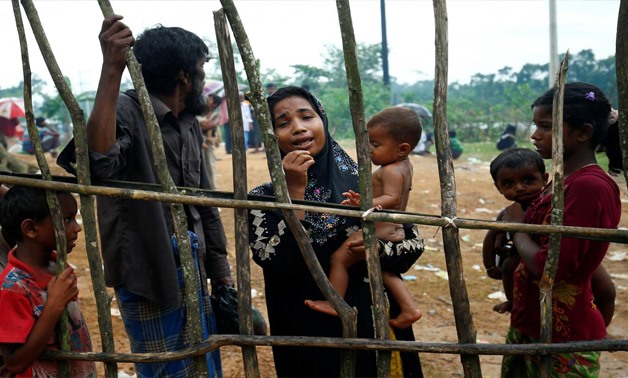
A new Rohingya refugee woman cries as they arrive near the Kutupalang makeshift Refugee Camp, in Cox’s Bazar, Bangladesh, August 30, 2017. REUTERS/Mohammad Ponir Hossain
CAIRO – 25 October 2017: The United Nations Office for Coordination of Humanitarian Affairs (OCHA) published on Monday facts to raise awareness on the Rohingya crisis. The organization aims to break silence on the persecution in Myanmar and secure necessary support to 809,900 refugees in need.
In September, the UN’s Human Rights chief, Zeid Ra’ad Al Hussein, described the government’s operations in Myanmar as a “textbook example of ethnic cleansing.” In addition, French President Emmanuel Macron described the situation as genocide.
OCHA reported the following facts, dates and numbers to reflect the magnitude of the crisis:
1982: The year the government in Myanmar passed a law identifying 135 national ethnic groups as “recognized” groups that can claim citizenship. However, the Rohingya Muslim minority concentrated in Rakhine was not among these groups, and thus they became stateless. Myanmar considers the Rohingya to be economic migrants from Bangladesh, though most can show their families have been in the country for generations.
 Rohingya families arrive in Bangladesh after being stranded for days at the Myanmar border – UNHCR Photo/Roger Arnold
Rohingya families arrive in Bangladesh after being stranded for days at the Myanmar border – UNHCR Photo/Roger Arnold
The Rohingya Muslims are considered the largest stateless population in the world nowadays. Their freedom of movement and their access to education and health services is severely restricted.
 Rohingya refugees arriving in Bangladesh – UNHCR Photo/Roger Arnold
Rohingya refugees arriving in Bangladesh – UNHCR Photo/Roger Arnold
On
August 25, the Arakan Rohingya Salvation Army (Arsa) in Rakhine state started attacking police points, prompting a violent response by Myanmar’s security forces. Around
600,000 Rohingya Muslims were forced to flee to Bangladesh, and
288 villages have been destroyed since August 25.
These refugees joined 200,000 others already being sheltered in Bangladesh, raising the number of Rohingya refugees to
809,000 refugees, with an average of
10,333 refugees crossing daily to Bangladesh. The refugees reported stories of mass killings, arson, rape and abuse as they walked for days to reach their refuge destination. In Bangladesh, the World Health Organization (WHO) and the government of Bangladesh administered oral cholera vaccinations to more than
700,000 people.
 A reception point for Rohingya refugees at a school in Bangladesh – OCHA Photo/Anthony Burke
A reception point for Rohingya refugees at a school in Bangladesh – OCHA Photo/Anthony Burke
OCHA, the International Organization of Migration (IOM) and the Office of the UN High Commissioner for Refugees (UNHCR) organized a pledging conference in Geneva co-hosted by the European Union and the government of Kuwait. The conference called for
$434 million to respond to the needs of the Rohingya refugees and to support the host communities in Bangladesh with emergency relief and protection.
The identified priorities by the humanitarian community in the conference included clean water and sanitation, shelter, food, and psychosocial support services to traumatized children, women and men.
 A woman collects hygiene kits for her family at a Rohingya temporary settlement camp in Bangladesh – IOM Photo/Muse Mohammed]
A woman collects hygiene kits for her family at a Rohingya temporary settlement camp in Bangladesh – IOM Photo/Muse Mohammed]
“Without these vital funds, humanitarian agencies will not be able to continue to provide protection and life-saving aid to one of the most vulnerable groups in the world,” said IOM Director William Lacy Swing during the conference.
In early September, UN Secretary-General Antonio Guterres sent a letter to the UN Security Council warning about the "humanitarian catastrophe" unfolding in Myanmar and raising fears that it could have "implications for peace and security" beyond the country’s borders.
 U.N. Secretary-General Antonio Guterres briefs the Security Council meeting on the situation in the Rahkine state of Myanmar - UN Photo/Kim Haughton]
U.N. Secretary-General Antonio Guterres briefs the Security Council meeting on the situation in the Rahkine state of Myanmar - UN Photo/Kim Haughton]
Also in September, Britain, France, the U.S., Egypt, Kazakhstan, Senegal and Sweden requested that the UN Security Council meet and discuss the urgent need to halt the killing in Myanmar. During the meeting, Guterres called for “swift action and a durable solution to prevent further instability that provides a breeding ground for radicalization and puts vulnerable people at grave risk.” The UN chief added that the situation in Myanmar is the fastest developing refugee emergency.
In 2013, the UN General Assembly passed a resolution calling on the Buddhist-majority in Myanmar to cut back violence against Muslims. The government spokesperson then, Ye Htut, replied in a statement, saying, “Citizenship will not be granted to those who are not entitled to it, no matter whoever applies pressure on us.” He added, “It is our sovereign right.”






Comments
Leave a Comment